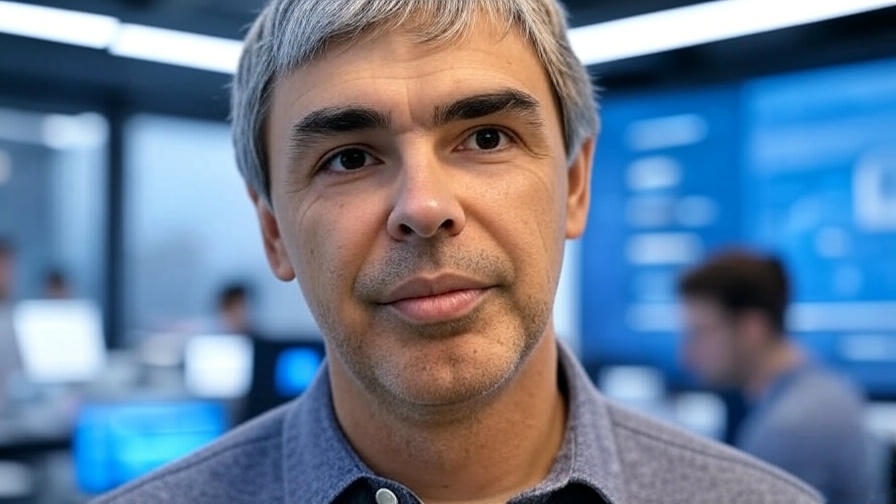Larry Page is a name synonymous with innovation, ambition, and the digital revolution. As the co-founder of Google, one of the most influential companies in the world, Page’s contributions have reshaped how we access information, communicate, and interact with technology. This article dives into the life, achievements, and legacy of Larry Page, written in a simple and engaging way for readers of all backgrounds. From his early days to his role in building a tech empire, we’ll explore the man behind the search engine that changed the world.
𝗘𝗮𝗿𝗹𝘆 𝗟𝗶𝗳𝗲 𝗮𝗻𝗱 𝗕𝗮𝗰𝗸𝗴𝗿𝗼𝘂𝗻𝗱
Lawrence Edward Page, known as Larry Page, was born on March 26, 1973, in East Lansing, Michigan, USA. He grew up in a household steeped in technology and academia. His father, Carl Victor Page Sr., was a computer science professor at Michigan State University, and his mother, Gloria Page, was an instructor in computer programming. This environment sparked Larry’s curiosity about computers from a young age. By the time he was six, he was tinkering with computers, and his home was filled with early personal computers and tech magazines.
Larry’s passion for invention was evident early on. He once said he wanted to be an inventor, inspired by figures like Nikola Tesla. His older brother, Carl Jr., also encouraged him to explore technology by taking apart gadgets and putting them back together. This hands-on approach to learning shaped Larry’s problem-solving mindset, which would later define his career.
Page attended East Lansing High School, where he excelled academically. He later enrolled at the University of Michigan, earning a bachelor’s degree in computer engineering. His time at Michigan was pivotal, as he participated in the university’s solar car team, showcasing his knack for leadership and innovation. After graduating, he pursued a Ph.D. in computer science at Stanford University, where his life would change forever.
𝗧𝗵𝗲 𝗕𝗶𝗿𝘁𝗵 𝗼𝗳 𝗚𝗼𝗼𝗴𝗹𝗲
At Stanford in 1995, Larry Page met Sergey Brin, another Ph.D. student with a shared interest in data and technology. The two didn’t hit it off immediately—Larry once described their first meeting as argumentative—but their intellectual chemistry soon became unstoppable. Together, they embarked on a research project that would become the foundation of Google.
The idea for Google stemmed from a simple question: How can we organize the vast amount of information on the internet? At the time, search engines like Yahoo! and AltaVista existed, but they were limited, often returning irrelevant results. Page and Brin wanted to create a better way to search the web. Page’s insight was to focus on the web’s structure—specifically, the links between pages. He believed that a webpage’s importance could be measured by how many other pages linked to it, a concept that became the backbone of Google’s search algorithm, called PageRank (named after Larry himself).
In 1996, Page and Brin began working on a project called “Backrub,” which analyzed the web’s link structure. They realized that ranking pages based on their relevance and authority could revolutionize search. By 1998, they had refined their idea and renamed it “Google,” a play on the word “googol” (the number 1 followed by 100 zeros), symbolizing their mission to organize the world’s information.
They built the first version of Google on Stanford’s servers, but the project quickly outgrew the university’s resources. Page and Brin maxed out credit cards, borrowed money, and worked out of a garage to keep the dream alive. In 1998, they secured their first major investment—$100,000 from Sun Microsystems co-founder Andy Bechtolsheim. With this funding, Google Inc. was officially born.
𝗕𝘂𝗶𝗹𝗱𝗶𝗻𝗴 𝗮 𝗧𝗲𝗰𝗵 𝗚𝗶𝗮𝗻𝘁
Google’s early days were chaotic but exciting. Page and Brin moved into a rented garage in Menlo Park, California, owned by Susan Wojcicki (who later became YouTube’s CEO). They hired their first employees, including Craig Silverstein, and focused on improving their search engine. By 2000, Google was handling millions of searches daily, and its clean, minimalist design stood out against cluttered competitors.
Larry Page served as Google’s first CEO from 1998 to 2001. His focus was on innovation and user experience. He pushed for simplicity in Google’s interface, insisting that the homepage remain uncluttered—a decision that became iconic. Page also emphasized speed, believing that users deserved instant results. This obsession with efficiency helped Google dominate the search market.
In 2001, Page stepped down as CEO to make way for Eric Schmidt, a seasoned executive who could scale the company. Page took on the role of President of Products, allowing him to focus on innovation. During this period, Google launched transformative products like Google News, Google Images, and AdWords, the advertising platform that became the company’s financial engine. Page’s vision was to make Google more than a search engine—it was to be a platform for solving problems.
In 2011, Page returned as CEO, ready to lead Google into its next phase. Under his leadership, Google expanded into new areas, including mobile (Android), video (YouTube), cloud computing, and hardware (Google Pixel). He also spearheaded ambitious “moonshot” projects through Google X (later X), such as self-driving cars (Waymo) and internet-beaming balloons (Loon). Page’s willingness to take risks set Google apart as a company that didn’t just follow trends but created them.
𝗧𝗵𝗲 𝗖𝗿𝗲𝗮𝘁𝗶𝗼𝗻 𝗼𝗳 𝗔𝗹𝗽𝗵𝗮𝗯𝗲𝘁
By 2015, Google had grown into a massive company with diverse projects. To streamline operations and give each division more focus, Page and Brin announced the creation of Alphabet Inc., a parent company that would oversee Google and its “Other Bets” (like Waymo, Verily, and DeepMind). Page became Alphabet’s CEO, while Sundar Pichai took over as Google’s CEO.
Alphabet allowed Page to focus on long-term innovation. He stepped back from day-to-day operations at Google, diving into futuristic projects like artificial intelligence, healthcare, and urban innovation. His goal was to tackle big problems, from curing diseases to building smarter cities. This restructuring also gave Page and Brin more freedom to explore their passions while ensuring Google remained competitive.
𝗟𝗮𝗿𝗿𝘆 𝗣𝗮𝗴𝗲’𝘀 𝗟𝗲𝗮𝗱𝗲𝗿𝘀𝗵𝗶𝗽 𝗦𝘁𝘆𝗹𝗲 𝗮𝗻𝗱 𝗣𝗵𝗶𝗹𝗼𝘀𝗼𝗽𝗵𝘆
Larry Page is known for his bold, forward-thinking approach. His leadership style is rooted in a few core principles:
✓ Think Big: Page believes in setting ambitious goals, or “moonshots.” He once said, “If you’re not doing something crazy, you’re doing the wrong things.” This mindset led to projects like Google Glass and Waymo, even if not all succeeded commercially.
✓ Focus on the User: Page’s obsession with user experience drove Google’s success. He prioritized speed, simplicity, and relevance, ensuring that Google’s products were intuitive and helpful.
✓ Embrace Failure: Page encouraged experimentation, even if it meant failing. He believed that taking risks was essential for breakthroughs, a philosophy that shaped Google’s culture of innovation.
✓ Data-Driven Decisions: Page relied on data to guide decisions, from improving search algorithms to optimizing ads. This analytical approach helped Google stay ahead of competitors.
Despite his achievements, Page is famously private. He rarely gives interviews and prefers to let his work speak for itself. Colleagues describe him as intense, curious, and deeply committed to solving complex problems.
𝗞𝗲𝘆 𝗔𝗰𝗵𝗶𝗲𝘃𝗲𝗺𝗲𝗻𝘁𝘀 𝗮𝗻𝗱 𝗜𝗺𝗽𝗮𝗰𝘁
Larry Page’s contributions to technology and society are immense. Here are some of his most notable achievements:
✓ Google Search: Page’s PageRank algorithm revolutionized how we find information online. Today, Google processes over 8.5 billion searches daily, making it an essential part of modern life.
✓ Android: Under Page’s leadership, Google acquired Android Inc. in 2005 for $50 million. Today, Android powers over 2.5 billion devices worldwide, from smartphones to TVs.
✓ YouTube: Google acquired YouTube in 2006 for $1.65 billion, a decision Page supported. YouTube is now the world’s largest video platform, with over 2 billion monthly users.
✓ Moonshot Projects: Page’s vision for Alphabet led to groundbreaking initiatives like Waymo (self-driving cars), Verily (healthcare innovation), and DeepMind (AI research). These projects aim to solve global challenges, from transportation to disease prevention.
✓ Philanthropy: Page has donated millions to causes like renewable energy and global health. Through the Larry and Lucy Page Family Foundation, he supports education and scientific research.
Page’s work has earned him numerous accolades, including being named one of TIME’s 100 Most Influential People and ranking among Forbes’ richest individuals. As of 2025, his net worth is estimated at over $100 billion, largely due to his Alphabet stock.
𝗖𝗵𝗮𝗹𝗹𝗲𝗻𝗴𝗲𝘀 𝗮𝗻𝗱 𝗖𝗼𝗻𝘁𝗿𝗼𝘃𝗲𝗿𝘀𝗶𝗲𝘀
No story of success is without challenges. Google, under Page’s leadership, faced scrutiny over privacy, antitrust issues, and its dominance in the tech industry. Critics argued that Google’s data collection practices raised ethical concerns, while regulators in the U.S. and Europe investigated the company for monopolistic behavior. Page often defended Google’s mission, emphasizing its commitment to users, but these controversies highlighted the complexities of running a tech giant.
Additionally, some of Page’s moonshot projects, like Google Glass and Project Loon, faced setbacks. Glass struggled with privacy concerns and limited adoption, while Loon was shut down in 2021 due to high costs. However, Page viewed these failures as part of the innovation process, learning from them to fuel future successes.
𝗣𝗲𝗿𝘀𝗼𝗻𝗮𝗹 𝗟𝗶𝗳𝗲 𝗮𝗻𝗱 𝗟𝗲𝗴𝗮𝗰𝘆
Larry Page is married to Lucinda Southworth, a research scientist, and they have two children. The couple is known for their low-key lifestyle, despite their wealth. Page has faced health challenges, including vocal cord paralysis, which he discussed publicly in 2013. This condition affected his ability to speak but didn’t slow his ambitions.
In 2019, Page stepped down as Alphabet’s CEO, handing the role to Sundar Pichai. He remains a board member and major shareholder, but his focus has shifted to personal projects and philanthropy. Page is passionate about renewable energy, space exploration, and advancing AI for societal good.
Larry Page’s legacy is profound. He didn’t just build a company; he created a platform that transformed how we live, work, and learn. Google’s tools—Search, Maps, Translate, and more—are now integral to daily life. His emphasis on big ideas continues to inspire entrepreneurs and innovators worldwide.
𝗪𝗵𝗮𝘁 𝗖𝗮𝗻 𝗪𝗲 𝗟𝗲𝗮𝗿𝗻 𝗳𝗿𝗼𝗺 𝗟𝗮𝗿𝗿𝘆 𝗣𝗮𝗴𝗲?
Larry Page’s story offers valuable lessons for anyone, from students to aspiring entrepreneurs:
✓ Follow Your Curiosity: Page’s childhood tinkering with computers led to a world-changing idea. Pursue what excites you, even if it seems small at first.
✓ Solve Real Problems: Google succeeded because it addressed a universal need—finding information quickly. Focus on creating value for others.
✓ Take Risks: Page’s moonshots show that bold ideas can lead to breakthroughs, even if they don’t always succeed.
✓ Stay Humble: Despite his wealth and influence, Page remains private and focused on impact over fame.
✓ Collaborate: Page’s partnership with Sergey Brin proves that great ideas thrive with teamwork.
𝗧𝗵𝗲 𝗙𝘂𝘁𝘂𝗿𝗲 𝗼𝗳 𝗟𝗮𝗿𝗿𝘆 𝗣𝗮𝗴𝗲’𝘀 𝗩𝗶𝘀𝗶𝗼𝗻
As of 2025, Larry Page continues to shape the future through his investments and advisory role at Alphabet. His focus on AI, healthcare, and sustainability suggests he’s still chasing big problems. Projects like Waymo and DeepMind are pushing boundaries, while his philanthropy supports a better world.
Page’s vision extends beyond Earth. He’s an advocate for space exploration and has invested in companies like Planetary Resources, which aims to mine asteroids. His belief in technology’s potential to solve humanity’s challenges remains unshaken.
𝗖𝗼𝗻𝗰𝗹𝘂𝘀𝗶𝗼𝗻
Larry Page is more than the co-founder of Google—he’s a visionary who dared to dream big and change the world. From a curious kid in Michigan to the architect of a tech empire, his journey shows what’s possible with creativity, persistence, and a commitment to making life better. Whether you’re searching for answers on Google, navigating with Maps, or watching a YouTube video, you’re experiencing Larry Page’s legacy. His story reminds us that the biggest ideas often start with a simple question—and the courage to find the answer.

